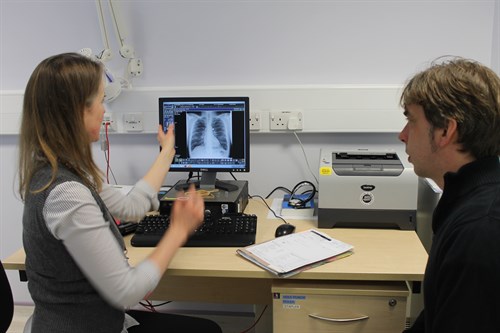
What happens when you find a lump?
Be assured that testicular cancer is very rare, but also very
treatable. Only around four in a hundred men seen
with a testicular lump will have a lump which is caused by cancer.
The first thing to do is go and see your GP.
If the doctor suspects the lump could be cancer he/she will
send you for an urgent referral, current NHS guidelines
recommend this should happen within two weeks. The first
test arranged is normally an ultrasound scan of the testicles. Dan
will tell you what it feels like.
Testicular cancers are well detected with ultrasound and it is
very common for the urologist to decide you need an orchidectomy
(removal of the testicle) on the findings of this test alone. The
operation will be performed very soon after the scan, often within
a week.
For more information regarding the operation, please download
the patient information leaflet for orchidectomy here.
The urologist will arrange for you to have a CT scan of your
chest, abdomen and pelvis and a blood test to measure your tumour
markers. This is to assess if the testicular cancer has spread to
other areas of the body. The most likely places for this to happen
are the lungs and the retroperitoneal lymph nodes. Most people know
where the lungs are, but have no idea what retroperitoneal lymph
nodes are.
Lymph nodes
Lymph nodes are tiny bean-shaped glands, located in many
different areas of the body. The main locations are the neck, under
the arms, and in the groin. The body has over 300 lymph
nodes filtering selected white blood cells and foreign
elements. The lymph node is a component of the lymphatic system
which moves lymph node fluid, waste substance, and nutrients
throughout your body, bloodstream and tissues.
Here is a picture of where the retroperitoneal lymph nodes
are:

Tumour markers
Testicular cancers often produce hormones that can be measured
in the blood. They are often called tumour markers. There
are three different markers that testicular cancers can
make:
- AFP or alpha feta protein
- HCG or human chorionic gonadotrophin
- LDH or lactate dehydrogenase
If you have abnormal levels of any of these markers in your
blood, then you could have testicular cancer. But you could have a
cancer without raised markers. Not all testicular cancers make
these chemicals.
The level of the tumour markers may be used by your doctor to
decide which treatment or follow up schedule you should have.
Occasionally the tumour markers levels can be very high
when the urologist sees you, and the team may decide to treat you
with chemotherapy before an orchidectomy.
Raised AFP is never found in pure seminoma - if it is, it means
there must be at least some non-seminoma cancer cells in the
tumour.
The level of the marker in your blood will be tested throughout
your treatment and your follow up. This is because the marker will
go down as your treatment works or it could rise again if your
cancer comes back after you have finished your treatment. You will
still be tested for markers as part of your follow up, even if you
have not had raised markers in the past.
Tom having a blood test
All this information then is sent to the Multidisciplinary
Team.
It is possible to cure testicular cancer at all stages, even if
it has spread. In most cases the most curable part of your
treatment has already occurred at this stage and a programme of
intense follow-up is recommended, called active surveillance. However, this depends on the team assessing
the stage of your testicular cancer.